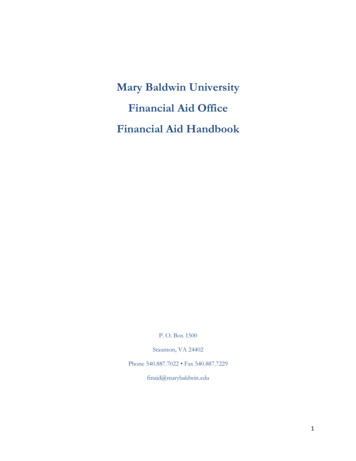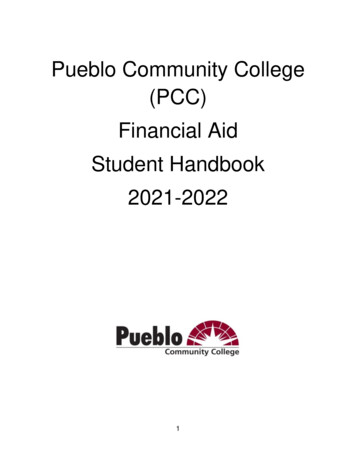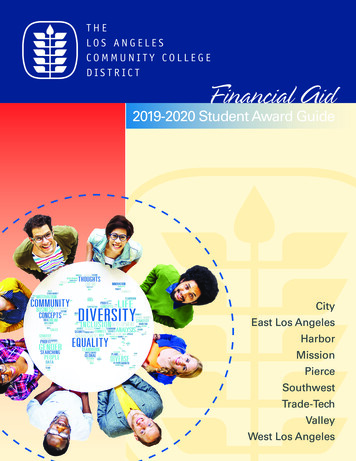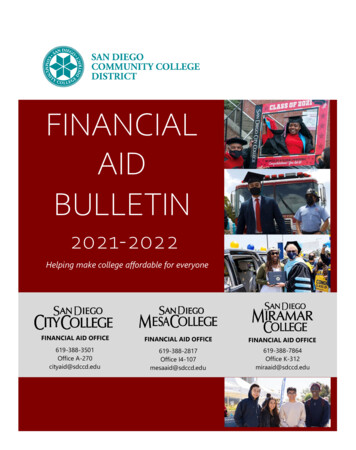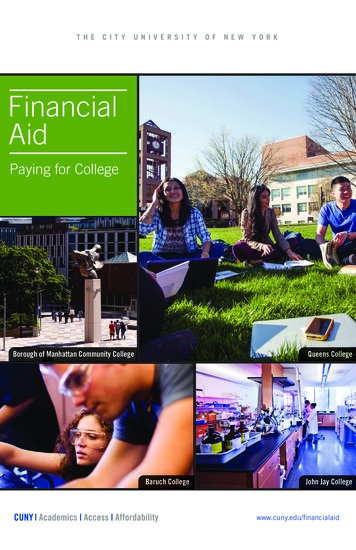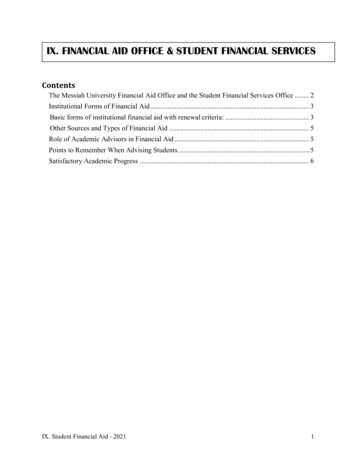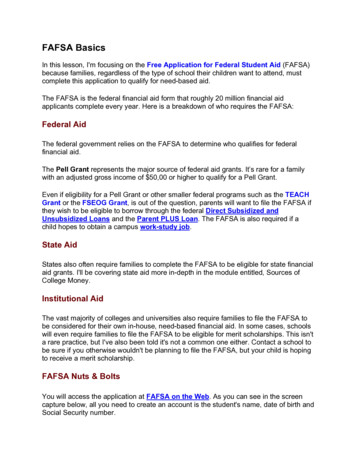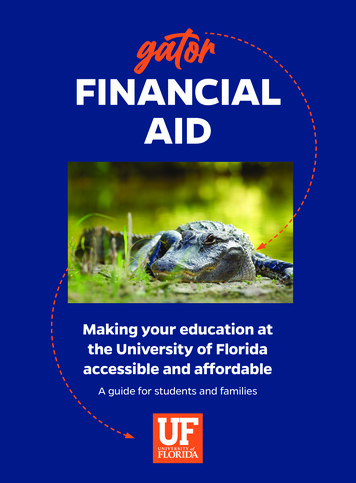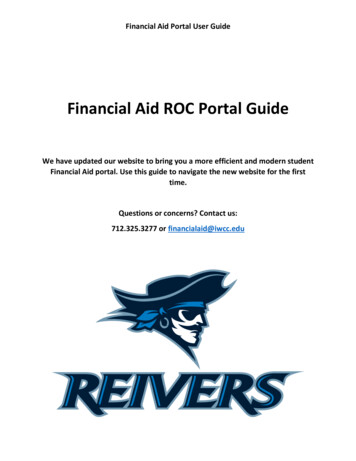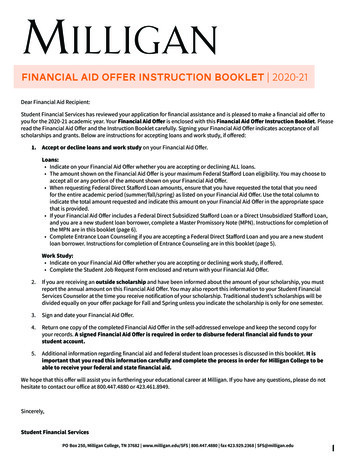
Transcription
FinancialAid
Financial AidApplying for Financial AidNash Community College makes every effort to provide financial assistance, where needexists, for students whose primary goal is to acquire post-secondary education. While students who qualify for aid are usually assisted, the institution expects that all resources at thestudents’ disposal will be used and that the financial aid will supplement these resources.Application ProcessAll applicants for financial aid at Nash Community College must: Complete “The Free Application For Federal Student Aid” (FAFSA) at http://fafsa.gov toreceive a “Student Aid Report” which determines eligibility. Complete and submit documents requested by the Financial Aid Office. If additional documents are needed, a Financial Aid Document Request letter will besent to your campus email account.Priority DatesIn order to provide adequate time for processing and awarding financial aid prior to the firstday of classes each semester, priority dates are established. Students that submit financialaid applications after the established priority dates should be prepared to pay for tuition,fees, and books. Financial aid award notifications are mailed (electronically or via the U.S.Postal Service) within two weeks of application file completion. Established priority datesfor receipt of all required application documents are as follows:Fall Semester - June 1Spring Semester - November 15Summer Semester - April 1Students are encouraged to apply for financial assistance when they apply for admission. Toreceive financial aid a student must have a high school diploma from an accredited schoolor high school equivalency and must be admitted to Nash Community College.The Financial Aid Office reserves the right to ask for verification of financial information anduses the standards in the current verification guide of the US Department of Education.Financial Aid is awarded on the basis of need and Satisfactory Academic Progress. It is essential to apply early (January through March) to be given priority consideration for aidsince applications will be processed on a first-come, first-served basis.Financial Aid is awarded based on full time enrollment. Adjustments to awards will be madebased on enrollment status after the ten percent point of the semester.Due to federal regulations, enrollment status is determined by Clock Hour conversion forall diploma and Pell eligible certificate programs. This conversion process may cause adecrease in a student’s financial aid award. (This directly affects students in diploma programs such as Cosmetology, Practical Nursing, etc.)78
Financial AidFinancial Aid advisors are available to answer any student questions related to financial aid.Drug Convictions and Financial Aid EligibilityStudents convicted of drug offenses committed while receiving Title IV federal financial aidmay be ineligible for federal financial aid for one or more years from the date of conviction.Federal aid includes: Federal Student Loans, Federal PLUS Loans, Federal Grants and FederalWork Study.Penalties for Drug ConvictionsPossession of Illegal Drugs: First Offense: 1 year from the date of conviction Second Offense: 2 years from the date of conviction Third and Subsequent Offenses: Indefinite ineligibility from the date of convictionSale of Illegal Drugs: First Offense: 2 years from the date of conviction Second and Subsequent Offenses: Indefinite ineligibility from the date of convictionHow to Regain Eligibility for Federal Financial Aid After a Drug ConvictionStudents can regain eligibility for federal programs no matter how many or what type ofdrug convictions they have. Students must successfully complete an acceptable drug rehabilitation program that meets the standards set by Congress and the Department of Education. Students will regain eligibility on the date the program is completed.What is an Acceptable Drug Rehabilitation Program?An acceptable drug rehabilitation program must require passing TWO unannounced drugtests AND it must either:1. Be qualified to receive funds from a federal, state or local government agency or program, or from a state or federally licensed insurance company, or2. Be administered or recognized by a federal, state or local government agency or court,or by a state or federally licensed hospital, health clinic, or medical doctor.Free Application for Federal Student Aid (FAFSA)Question 23 on the FAFSA form asks if the student has ever been convicted of a drug relatedoffense. Answering this question falsely, if discovered, could result in fines up to 20,000,imprisonment, or both.Convictions During EnrollmentAccording to the United States Department of Education, if a student is convicted of adrug offense after receiving federal aid, the student must notify the Financial Aid Office79
Financial Aidimmediately and that student will be ineligible for further aid and required to pay back allaid received after the conviction.Types of AidThere are two main types of aid for which a student may be eligible: Gift Aid, which consistsof grants and scholarships and does not have to be repaid, and Self-Help Aid which consistsof loans and part-time employment. Loans must be repaid.Each program is regulated by federal, state, and institutional policies. It is essential to consult the Financial Aid Office for details concerning financial aid program specifics, rights andresponsibilities of the student, budget information, eligibility criteria, and the applicationprocess.Gift AidGrantsA grant is a gift that does not have to be repaid. Grants available include:Federal Pell GrantFederal Pell Grants make funds available to eligible Nash Community College studentsbased on enrollment status in a one or two-year curriculum. The actual amount of the grantis determined by the Department of Education. Undergraduate students who have a Bachelor’s Degree and/or who are in default of student loans or who have received an overpayment are not eligible for Federal Pell Grants.Federal Supplemental Educational Opportunity Grant (FSEOG)Federal Supplemental Educational Opportunity Grants are gift aid for undergraduates withexceptional financial need. Pell Grant recipients with the lowest Expected Family Contributions (EFCs) are given first priority.North Carolina Community College GrantStudents must be North Carolina residents enrolled for at least six (6) credit hours per semester in curriculum programs. Eligibility is determined based on the same criteria as theFederal Pell Grant; students not eligible for the Federal Pell Grant may be considered forthe grant based on their expected family contribution as determined on the Student AidReport. Students who have earned the baccalaureate (4 year) college degree are ineligible.North Carolina Education Lottery ScholarshipTo be eligible, students must be North Carolina residents enrolled for at least six (6) credithours per semester in curriculum programs. Eligibility is determined based on the samecriteria as the Federal Pell Grant; students not eligible for the Federal Pell Grant may beconsidered for the grant based on their expected family contribution as determined on80
Financial Aidthe Student Aid Report. Students who have earned the baccalaureate (4 year) college degree are ineligible. Applicants must complete the Free Application for Federal Student Aid(FAFSA) which is also used to qualify for Federal Pell Grants.Child Care Grant ProgramAssistance with child care expenses from the Child Care Grant Program is contingent uponavailability of funds for qualified students enrolled in eligible programs. Applications areavailable in the Financial Aid Office.Self-Help AidDirect LoansDirect Loans are low-interest loans for students to help pay for the cost of education afterhigh school. The lender is the U. S. Department of Education and serviced by authorizedinstitutions.A Subsidized Loan is awarded on the basis of financial need. The six month grace periodon interest charged on federal student loans has been suspended, meaning that interestwill begin accumulating immediately after a student graduates. This will affect loans madebetween July 1, 2012 and June 30, 2014.An Unsubsidized Loan is not awarded on the basis of need. Students will be charged interest from the time the loan is disbursed until it is paid in full. If students allow the interestto accrue (accumulate) while in school or during other periods of nonpayment, it will beCAPITALIZED – interest will be added to the principal amount of the loan, and additionalinterest will be based on the higher amount.Students interested in the Direct Loan Program must complete the following:1.Be admitted into an approved degree, diploma or certificate program, and be maintaining Satisfactory Academic Progress in that program.2.Complete the FAFSA (Free Application for Federal Student Aid) for the current aid year.3.Provide additional documents if requested by the Financial Aid Office. SometimesFAFSA data is incomplete, or the US Department of Education selects a student forverification. If the Financial Aid Office needs additional information before determining your loan eligibility, please comply as quickly as possible.4.Complete the Nash Community College Loan Confirmation Form available on the College’s website.81
Financial Aid5.Complete Loan Entrance Counseling. This can be done online at www.studentloans.gov. Once you access this web site, select “Log In” on the right side of the page. Ifyou have had a previous loan with Nash Community College or other institutions, youmust complete this process again for the current aid year.6.Complete the Electronic Master Promissory Note (MPN) at the secure Departmentof Education site at www.studentloans.gov. Once you access this web site, select theoption for “Complete Master Promissory Note.” If you have had a previous loan withNash Community College or other institutions, you must complete this process againfor the current aid year.7.Review your Federal Stafford Loan balance and/or total debt by going to the NationalStudent Loan Database System www.nslds.ed.gov, print and attach a copy to yourapplication. Your loan will not be processed if you do not include a copy of your loansummary.8.Determine how much the student needs to borrow and the loan period. This will allowthe student to complete the Loan Amount Requested and the Requested Loan Termon the Nash Community College Loan Confirmation Form. All loans come in TWOdisbursements.Student TypeCompletedCreditsSubsidizedUnsubsidizedAnnual Max(Sub Unsub)DependentLess than 33 3,500 2,000 5,500Dependent33 or more 4,500 2,000 6,500IndependentLess than 33 3,500 6,000 9,500Independent33 or more 4,500 6,000 10,500Note: Students enrolled in all pre-curriculum courses will be limited to borrowing at the firstyear level until they complete the required pre-curriculum courses.9.Complete the Nash Community College Loan Confirmation Form (www.nashcc.edu)by December 1 for fall semester, April 15 for spring semester, and June 1 for summerterm.10.Attend and finish your classes. You must attend your classes to be eligible for the loandisbursements. If you withdraw or drop below half-time (6 credits) before your loan isdisbursed, the funds will be returned to the Department of Education. Loan refunds(balances remaining after tuition and book charges are deducted) will be disbursedaccording to the refund method previously selected by the student using HeartlandECSI’s RefundSelect portal. Refund dates will be posted on the Financial Aid web site.82
Financial AidNote: Transfer students will not be able to receive the full yearly award if they havealready received a disbursement from another school.Loan IncreaseIf students want to increase their loan, then they must complete the Nash Community College Loan Increase Form. The student must specify the reason for the increase, and the reason must be in accordance to the requirements listed on the master promissory note. Theform must be completed by December 1 for fall semester, April 15 for spring semester, andJune 1 for summer term.Exit CounselingStudents must complete exit counseling if they have either dropped below half time (lessthan 6 hours), have left the college due to withdrawing or have graduated. The Departmentof Education (regardless if the student plans to transfer to another school), regulations require that students complete an exit counseling session for their subsidized or unsubsidized Federal Stafford Loans.The counseling session provides information about how to manage student loans after college and provides information on loan repayment. Exit Loan Counseling can be completedon the federal web site at www.studentloans.gov.You will not be allowed to reregister for classes or to request transcripts from the Collegeuntil the exit counseling session has been completed.Student EmploymentThe Federal College Work Study ProgramThe Federal College Work Study Program provides part-time work in academic and administrative departments on campus for eligible students to assist them with paying part oftheir educational expenses while attending classes. Students must complete the “Free Application for Federal Student Aid” (FASFA), be enrolled at least half-time, and be makingsatisfactory progress in an eligible program. Applications are available in the Financial AidOffice.To Maintain Eligibility for Financial AidTo remain eligible for financial aid, a student must satisfy requirements of the followingpolicies:Satisfactory Academic ProgressThe Federal Student Financial Handbook states the following: “The regulations for satisfactory progress were initially published in October 1983 and were amended on December 1,1987; April 29, 1994; and November 29, 1994. Every school participating in Student Financial83
Financial AidAssistance (SFA) Programs must monitor its SFA recipients to ensure that they are meetingsatisfactory progress standards.”Satisfactory Academic Progress will be calculated at the end of each academic term and willinclude all periods of enrollment.In order to be eligible for financial aid, students must meet the following minimumguidelines: Maximum Time Frame: Students must complete an eligible program within a timeframe not to exceed 1.5 times the normal published time frame. For example, if theacademic program length is 70 credit hours, the maximum credit hours that may beattempted is 105 credit hours (70 X 1.5 105). The calculation of the maximum timeframe includes all hours attempted at Nash Community College and transfer creditsfrom other institutions. Quantitative Standard: Students must complete 67 percent of the total cumulativecredit hours attempted. For example, if a student has attempted 50 credit hours, thestudent must earn credit for at least 33 hours (50 X .67 33.5). Course grades of AU, R/RT, W, WA, WF, WP, F, and I are not considered completions and will adversely affect astudent’s satisfactory academic rate calculations. Qualitative Standard: Students must maintain successful academic progress as definedby the Nash Community College catalog (1-36 hours attempted, minimum GPA of 1.5;over 36 hours attempted, minimum 2.0 GPA).Students who fail to meet the minimum standards for Satisfactory Academic Progress atthe end of the semester will be placed on financial aid warning. A student may continue toreceive financial aid for one semester while on financial aid warning provided they are otherwise eligible. Students should use this opportunity to re-establish Satisfactory AcademicProgress. If, at the end of the financial aid warning period, the student is meeting the minimum requirements for satisfactory academic progress, the financial aid warning is lifted.Students who fail to make Satisfactory Academic Progress after the financial aid warning semester will be ineligible for financial aid until satisfactory progress has been met. A studentmay attend the next semester(s) (at the student’s expense) in order to meet the mini- mumstandards for Satisfactory Academic Progress.Satisfactory Academic Progress (SAP) AppealsStudents have an opportunity to appeal their financial aid if they are placed on financial aidsuspension. Each student has a lifetime total of three times to appeal their aid. Studentswill be notified about their SAP status once grades are posted at the end of the semesterand will receive a Satisfactory Academic Progress Appeal Form. Appeals will not be grantedfor previous semesters. Appeals can only be reviewed for the current semester for which thestudent is seeking enrollment. No appeals will be retroactive.84
Financial AidAn appeal will be granted only if the student can document extenuating circumstances thatprevent him or her from meeting the Satisfactory Academic Progress Standards. Appealssubmitted without documentation will not be considered. Documentation may include,but is not limited to, one or more of the following: statement signed by a physician withdates of treatment/hospitalization verifying that the student’s medical condition significantly impacted his or her ability to successfully complete the semester; death certificatesor obituary; statement from employer on letterhead and signed by a supervisor, etc. Students must provide a typed explanation stating the reason(s) for their appeal. They mustindicate how their circumstances have changed so that they can comply with the policy inthe future.All appeals will be reviewed by the SAP Financial Aid Review Committee. The SAP FinancialAid Review Committee does not meet with students or supporting parties; therefore, it isimportant for you to provide all information requested on the SAP Appeal Form. The SAPFinancial Aid Review Committee meets the first Thursday of every month. In order for thestudent’s appeal to be reviewed by the committee, the appeal must be submitted to theFinancial Aid Office by 12:00 noon on the Wednesday before the Financial Aid Review Committee meeting.Financial Aid Policies and ProceduresFinancial aid award packages are based on current funding information from state and/or federal governments and are subject to change. Awards will automatically be posted toa student’s account once all items that have been requested from the Financial Aid Officehave been received and processed. Students must notify the Financial Office if they decidenot to attend Nash Community College or if they choose to decline any funds awarded tothem.Financial aid funds are credited to the student’s account at the beginning of each semester to be applied to eligible education expenses. Tuition, fees, and campus store chargesare deducted from available financial aid funds. The financial aid office will verify class attendance for each financial aid student. Once attendance and enrollment status has beenverified, the remaining award will be disbursed according to the refund method previouslyselected by the student using Heartland ECSI’s RefundSelect portal.A student must be enrolled in an eligible program to receive financial aid. Any classes takenoutside of the student’s current program of study may cause a decrease to his/her expectedfinancial aid award.A student cannot receive financial aid for classes completed by proficiency examination orclasses that are audited.85
Financial AidIf a student withdraws from all of his/her classes before the 60 percent point in the enrollment period, he/she will be required to repay a portion of the award to the US Departmentof Education. The student will need to make arrangements to repay this money within 45days from the withdrawal date. The student should understand, as well, that they couldpossibly become ineligible for financial aid if they do not make arrangements to repay themoney to the US Department of Education.Financial aid recipients must renew applications each year to be considered for the upcoming academic year as outlined in “Applying for Financial Aid.”Lifetime LimitEffective with the 2012-2013 Award Year, a student’s eligibility for Federal Pell Grant is limitedto 12 semesters (or its equivalent).Refunds and RepaymentRefunds to students receiving Title IV federal funds will be handled in the same manner asspecified in the institutional refund policy. The refund policy of the College shall be consistent with the North Carolina Administrative Code and may designate different refund specifications for curriculum and continuing education. Information regarding refunds may beobtained from the Business Office. A student may be required to repay a portion of the Student Financial Assistance (SFA) award if he/she withdraws from the institution or reduceshis/her course load before the 60 percent point of the enrollment period.Financial Aid Disbursement OptionsAll eligible students whose financial aid has been processed will receive an email fromNash Community College’s disbursement partner, Heartland ECSI. This email will directthe student on how to select the student’s preferred refund method. Options will beavailable for refund disbursement methods. If the student is due a financial aid refund,the funds will be disbursed using the student’s selected refund method on a designateddate each semester.Late-Start ClassesStudents enrolled in late-start classes will have their disbursement reduced or will not receive a financial aid (Pell and/or Direct Loan) disbursement until the late-start classes havebegun and attendance has been verified with the instructor through the 10 percent pointof class. Please contact the Financial Aid Office for specific information regarding late-startclasses.Veterans AffairsA Veterans Certifying Official is available to assist veterans and eligible persons who wishto apply for VA educational assistance. Most programs being offered by the College are approved for training under the GI Bill . Application forms and information may be obtained86
Financial Aidfrom the Financial Aid Office or online at www.nashcc.edu/va. The VA sponsors the following educational assistance programs for qualifying veterans and other eligible persons:Chapter 30, 31, 32, 33, 35, 1606 and 1607.Students applying for VA benefits must meet curriculum program admission requirements.Please refer to the curriculum program admission section of the Nash Community Collegecatalog.In-State Tuition for Certain Veterans and Other IndividualsResidency and the appeals process is now regulated by the State of North Carolina. Thefollowing message regarding the residency appeal process is required of all students, andis managed by the state:The state of North Carolina partially subsidizes the cost of North Carolina public collegeand university tuition for all students whose domicile, or permanent legal residence, is inNorth Carolina. Residency determination establishes if students should have in-state orout-of-state tuition. Because North Carolina residency status is governed solely by NorthCarolina statute, lack of eligibility for in-state status in another state does not guarantee in-state status in North Carolina. The residency statute mandates only those who candemonstrate a minimum of twelve months of uninterrupted domicile (legal residence) inNorth Carolina are eligible for in-state tuition. The statute also places the burden of proofon the student to establish, by a preponderance of evidence, that they are a bona fidedomiciliary rather than mere residents of North Carolina.The Department of Veteran Affairs covers a percentage of in-state tuition for studentswho are eligible for the Post 9/11 GI Bill . Students who do not have 100% eligibility willneed to make payment arrangements for any remaining tuition balance.For more information about residency, how it’s determined, and the process for appealing residency status for the state of North Carolina, visit www.ncresidency.org. EffectiveAugust 1, 2021, Chapter 30, 31, and 33 recipients are no longer required to enroll at a publicinstitution of higher learning within a three-year period after leaving the service in orderto benefit from in-state tuition and fees.What Affects VA Benefits EligibilityIt is the responsibility of the veteran to advise the VA Certifying Officer regarding programand enrollment changes. Failure to notify the VA Certifying Officer of these changes mayresult in termination of benefits at the end of the subsequent term upon receipt of the student’s official grade report. Other factors that may create a loss or reduction of benefits are: Dropping courses Taking late starting classes Failing classes87
Financial Aid Taking hybrid or online coursework Taking courses previously passed, including by proficiency examination Being placed on Academic Probation I or Academic Probation II, or directedwithdrawal.Veterans Affairs (VA) DocumentationVA regulations governing institution-approved training of veterans and or dependents ofveterans require certain documents be on file with the Certifying Official prior to certification of enrollment. Certification will not be made until the VA Certifying Official receives alldocumentation. It takes approximately 60-90 days from the date of certification for benefitsto start.Required VA documentation are as follows:1.2.Nash Community College Admissions Application and all required curriculumprogram admissions documentation.Completed application for VA benefits and all required supporting documentation,including, but not limited to the following:a. Copy of DD-214 or National Guard form DD-2384, “NOBE”, signed by the unitcommander;b. Copy of marriage certificate (for spouse);c. Dependent children’s birth certificate (if applicable) and;*** If VA benefits have been received for prior training at another institution, completea Change of Program or Place of Training form (22-1955 for veteran and form 225495 for Dependents).Each semester, after tuition and fees have been paid, all veterans and dependents of veterans are required to submit the Veteran Services Enrollment Form.VA students will not be certified for benefits until the Certifying Official has received theVeteran Services Enrollment Form. The VA does not pay the tuition and fees for studentswho are receiving Chapter 30, 32, 35, 1606, or 1607 benefits. These students will need to usefinancial aid, pay out of pocket, or set up a payment plan to prevent their classes from being dropped.Chapter 33 & 31 VA StudentsAfter completing all of the proper steps for certification and having registered for classes,the VA Certifying Official will place a hold on Chapter 33 & 31 student’s schedule to preventbeing dropped from classes for non-payment.Vocational RehabilitationThe Vocational Rehabilitation Program offers services as necessary to enable a student witha physical and/or mental disability to become self-supporting. Students should contactVocational Rehabilitation Services at www.ncdhhs.gov/divisions/dvrs to apply foreducation assistance.88
Financial AidNCC Foundation Scholarship EndowmentsEndowed scholarships are derived from the interest earned on the principal amount of agift from the sponsor that has been invested for perpetuity. The college is honored thesecompanies and/or individuals have chosen to establish these perpetual gifts of education.Alzheimer’s Care ScholarshipCharles M. JohnsonMary Lachicotte “Sister” BaldwinScholarshipJack D. Ballard ScholarshipRobert E. Barnhill, Sr. Memorial ScholarshipRyan Barrett Memorial LinemanScholarshipEvelyn H. Bennett Nursing ScholarshipBenvenue Alumni Association ScholarshipThomas A. Betts, Sr. Memorial ScholarshipBlanchard Family ScholarshipCharles Wayne Blanton MemorialScholarshipDale C. and Genia T. Bone ScholarshipBowen Family ScholarshipElsie L. Brantley Memorial NursingScholarshipGeorge T. and Rosa A. Brodie ScholarshipWinnie Edwards Brown NursingScholarshipRonald E. Capps, Sr. Memorial ScholarshipThomas Cliett Family Culinary ScholarshipCommunity Hospice FoundationScholarshipKendall Cooper Memorial ScholarshipWilliam C. and Janet F. CooperNursing ScholarshipGerald P. Cox and Meilia S. Cox FamilyFoundation Nursing ScholarshipCresCom Bank - Henry GregoryMemorial ScholarshipCrown LSP Group ScholarshipCSX Endowed ScholarshipRobert C. Davis ScholarshipWayne and Sherron Deal HonoraryScholarshipDuke Energy Line Academy ScholarshipLloyd L. and Susan Bryant EnnisMath ScholarshipSteven D. Felton Business ScholarshipMilton P. Fields Family ScholarshipFinch ScholarshipPell & Sonny Foster EngineeringScholarshipKatherine B. Fountain andRichard T. Fountain, Jr. ScholarshipFriends with Heart ScholarshipAnnie Louise Gaynor MemorialNursing ScholarshipGlaxoSmithKline Scholars AwardJase Matthew Griffiths MemorialScholarshipE. B. Hale Memorial ScholarshipKate Spruill Harrison ScholarshipM. Samuel Hayworth Memorial ScholarshipJosephine Hackney Hedgepeth and MerionSmith Hedgepeth Memorial ScholarshipMyrtle Carter Henry Veterinary TechnologyScholarshipTeresa Herring Honorary NursingScholarshipCaroline and John H. High ScholarshipJimmy and Mary Charles HolmesMemorial ScholarshipDaisy and Harry Howell ScholarshipDavid Walter Howell Memorial ScholarshipIngram Construction Company EndowedChair for EngineeringCharles M. Johnson - Improved Orderof Redman Apache Tribe 2 ScholarshipEvelyn G. and Charles M. JohnsonScholarshipDr. Katherine M. Johnson HonoraryScholarshipL.A. and Mamie Ford Johnson and Jesseand Sally Harper Gay ScholarshipMarie B. Joyner Memorial ScholarshipTassie Ree Langley Academic ScholarshipHelen and Jack Laughery HonoraryScholarshipMansfield-Moore Veteran ScholarshipMerritt and Mary Frances MatthewsMemorial ScholarshipMack and Billie McDonald MemorialScholarshipDr. Craig David Miller Honorary ScholarshipAllan C. and Margaret L. MimsNursing ScholarshipJ. Edgar and Peggie T. Moore Excellencein Teaching and Staff AwardsJ. Edgar and Peggie T. MooreFaculty Senate ScholarshipPeggie Thigpen Moore EndowedChair for Culinary Arts89
Financial AidDavid S. Morgan Computer ScienceScholarshipMoring-Jennett ScholarshipNCC B
Student Loan Database System www.nslds.ed.gov, print and attach a copy to your application. Your loan will not be processed if you do not include a copy of your loan summary. 8. Determine how much the student needs to borrow and the loan period. This will allow the student to complete the Loan Amount Requested and the Requested Loan Term
